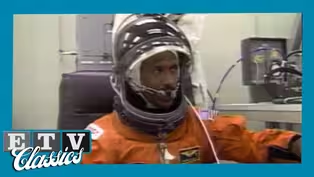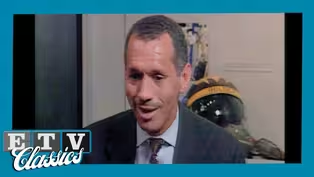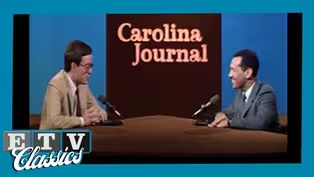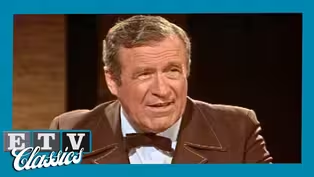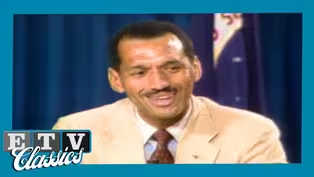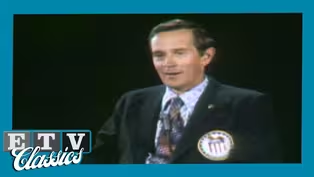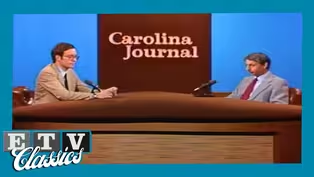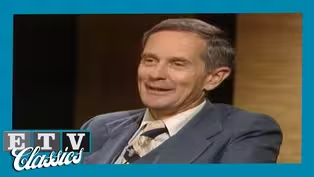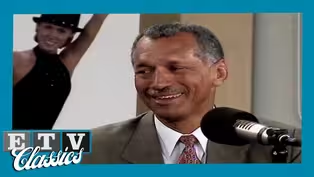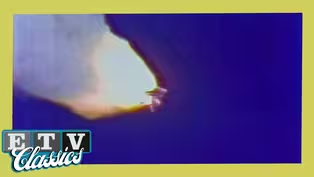ETV Classics
South Carolina Astronauts | Venture (1986)
Season 14 Episode 5 | 6m 51sVideo has Closed Captions
Learn more about the firsthand experiences of astronauts Charles Duke and Charles Bolden Jr.
Learn more about the firsthand experiences of astronauts Charles Duke and Charles Bolden Jr. and their time as astronauts in this episode of Venture.
Problems playing video? | Closed Captioning Feedback
Problems playing video? | Closed Captioning Feedback
ETV Classics is a local public television program presented by SCETV
Support for this program is provided by The ETV Endowment of South Carolina.
ETV Classics
South Carolina Astronauts | Venture (1986)
Season 14 Episode 5 | 6m 51sVideo has Closed Captions
Learn more about the firsthand experiences of astronauts Charles Duke and Charles Bolden Jr. and their time as astronauts in this episode of Venture.
Problems playing video? | Closed Captioning Feedback
How to Watch ETV Classics
ETV Classics is available to stream on pbs.org and the free PBS App, available on iPhone, Apple TV, Android TV, Android smartphones, Amazon Fire TV, Amazon Fire Tablet, Roku, Samsung Smart TV, and Vizio.
Providing Support for PBS.org
Learn Moreabout PBS online sponsorshipMore from This Collection
South Carolina is home to astronauts Charles Duke, Ronald McNair, and Charles Bolden Jr.
South Carolina in the Space Age | Palmetto Specials (1991)
Video has Closed Captions
A look back at the experiences of Charles F. Bolden Jr. and his rise to becoming an astronaut. (18m 50s)
Conversations with Scientists and Astronauts: Charles Bolden, Part 1 (1998)
Video has Closed Captions
Learn alongside students as they ask astronaut Charles F. Bolden Jr. questions. (19m 1s)
Colonel Charles Bolden: Aftermath of the Challenger | Carolina Journal (1986)
Video has Closed Captions
Colonel Charles Bolden offers a candid reflection on the space shuttle 'Challenger' disaster. (27m 50s)
Space Shuttle: Delays & Possibilities for the Future with Dr. LeConte Cathey | Open Line (1981)
Video has Closed Captions
Dr. LeConte Cathey discusses satellites, the space shuttle, and maintaining technology for space. (28m 47s)
Profile: Charles F. Bolden Jr. | Carolina Journal (1986)
Video has Closed Captions
A special look at the extraordinary legacy and life journey of astronaut Charles Bolden. (58m 59s)
Kennedy Space Center: Apollo 16 Launch | Nine30 (1972)
Video has Closed Captions
An in-depth look at the launch of Apollo 16 as well as the legacy of the Kennedy Space Center. (30m 6s)
Journalist in Space | Carolina Journal (1986)
Video has Closed Captions
Host Tom Fowler interviews Jack Bass, a member of NASA’s Journalist-In Space project. (27m 52s)
General Charles Duke | Open Line (1983)
Video has Closed Captions
Host Tom Fowler interviews Apollo 16 astronaut Charles Duke about his career with NASA. (28m 50s)
Brigadier General Charles Bolden Jr. | Xpress (2003)
Video has Closed Captions
An interview with former NASA administrator and astronaut Charles Bolden. (26m 45s)
Shuttle Challenger Accident | Carolina Journal (1986)
Video has Closed Captions
Host Tom Fowler brings the breaking news about the Space Shuttle Challenger to South Carolina. (29m 38s)
Providing Support for PBS.org
Learn Moreabout PBS online sponsorshipSouth Carolina astronauts, next on Venture.
Hello, I'm Angela Coxton.
Welcome to Venture.
The space age began in 1957.
Since that time, South Carolina has played an important role in the study of the heavens and the Earth.
♪ ♪ ♪ ♪ Space travel.
An exciting, thrilling, yet sometimes tragic voyage into the unknown.
Being an astronaut means you accept the challenge and risks involved in such a mission.
South Carolina currently has more astronauts in the NASA program than any other state in the nation.
Four of the 157 who have participated to date.
Brigadier General Charles Duke, who grew up in Lancaster, South Carolina, walked on the moon in 1972.
Gen. Charles Duke> I believe when I landed, it was like, "Yahoo, Houston!
We are here finally."
And then the step in the walk on the moon was probably the most significant.
And then again, the view on the Earth, a view of the Earth was, is I can still see that in my mind's eye as we came around from the back side of the moon the very first time and saw that Earth rise.
And it was spectacular.
♪ Angela> Astronaut Charles Bolden, just this past year, served as pilot on the space shuttle, the Columbia.
Charles Bolden> We did liftoff, I think about 6:55 in the morning.
And, as a first time guy, I must say that I thought, ...and the other experienced guys had me quite well prepared for what we were about to encounter.
You know, it seemed pretty calm and collected there until the main engines lit, and I got a slight glow off the, from the outside.
But when the solid rocket rocket boosters ignited, I knew that I was in for a rude awakening, that all my preparation, ...I don't know whether it was going to stand me in good stead or not.
We, did the roll program and right away got an alarm.
So that put me at ease because I thought right away.
Oh, it's just like being in the simulator.
And that set the tone for the rest of the ascent.
It was very, very impressive.
As a first time, flier, we lifted off in darkness and then started seeing sunlight almost right away when we got heads down.
We finally got to an altitude of about 61 miles when we had the main engines cut off, and that was almost 8 and a half minutes later.
We did have only two alarms during the ascent.
Both of them turned out to be, old sensors and no, no real big problem.
The most impressive thing to me about the ascent from a, from a physical point of view was the, the force that was exerted by during the 3-G throttle down, close to the main engine cutoff.
I had planned to do a lot of reach and visibility checks and, in feeling the force on my chest, I just said, well, forget about that.
I'm going to sit here and enjoy the ride.
♪ Angela> Perhaps most remembered of the astronauts is Ron McNair, a native of Lake City, South Carolina.
He lost his life in the tragic Challenger explosion of this past February.
Gen. Charles Duke> He does epitomize what many of us were willing to sacrifice for the advancement of a cause that we believed in.
Charles Bolden> Brother Ron was leading me through my pledge program with Omega Psi Phi.
He helped teach me what perseverance meant because he made it very difficult for me.
And he said, if you don't want it.
If you don't want it, you'll never get it.
He said, anything you want, you've got to try real hard.
You've got to stick to it.
And that's what perseverance is.
And I think the final thing that Ron would tell you, the final word would be uplift.
And Ron would look out on this crowd and he would say, everybody here has something to contribute.
Everybody here has some talent, some gift from God.
I'm really going to be upset, is what Ron would tell you.
If you don't use that gift from God and reach down and touch somebody else and bring them up.
Gen. Charles Duke> As I, see the developments and the changes, like we had to go through in Apollo when the fire, at Kennedy in 1967, out of that will come a better spacecraft and a better program.
Angela> And to be part of that improved NASA program South Carolina's newest astronaut, Frank Culbertson, will be representing the state.
♪ Gen. Charles Duke> Not once, do I remember telling my momma that I was one day going to walk on the moon?
♪ What I do remember was Pageland, South Carolina and my grandparents.
♪ The values that they taught me.
Charles Bolden>In my early time, it was just that, that stuff was, was not in the realm of possibility for, for, you know, a young Black growing up in Columbia.
Gen. Charles Duke> We were taught by our relatives and friends to be young men of character and integrity.
Charles Bolden> You should all have a dream.
Some type of dream.
And I would ask you if you would persevere in the pursuit of that dream.
Never give it up.
♪ ♪ Angela> South Carolina's new state museum, being built in Columbia, will have a space science center where South Carolina... Carolinians and visitors can come to learn more about our state's role in space science.
Support for PBS provided by:
ETV Classics is a local public television program presented by SCETV
Support for this program is provided by The ETV Endowment of South Carolina.
